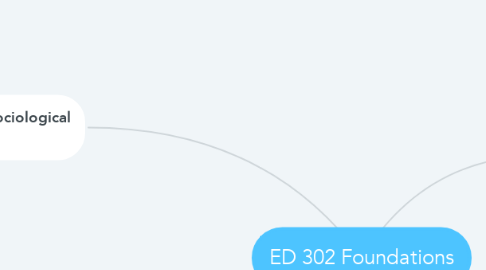
1. Chapter 2: The Politics of Education
1.1. 1. Identify and describe the four purposes of education. The first purpose is Intellectual. Intellectual is to teach basic cognitive skills such as math and reading. Political is the second and it is to inculcate allegiance to the existing political order. Thirdly, is social. It is used to help solve social problems and to work as one of many institutions, such as a family. And lastly we have economic. It is used to prepare students for their later occupational roles and to select, train, and allocate individuals into the division of labor.
1.1.1. 2.Choose and describe a perspective for each of the following: 1) the role of the school; 2) explanations of unequal performance; and 3) definition of educational problems. The role of the school is to be concerned with the aims, purposes, and functions of education in a society. The explanations of unequal performance is some say that individual students or groups of students begin school with different life chances and therefore some groups have significantly more advantages than others. And the definition of educational problems is schools have lost their traditional role of teaching moral standards and values.
2. Chapter 3: The History of Education
2.1. Reform Movement
2.1.1. 1. Horace Mann: 1839, First teacher training school
2.1.1.1. 2. Emma Hart: 1821, Troy Female Seminary
2.1.1.1.1. 3. Committee of Ten: 1893, Charles Eliot
2.2. Historical Interpretation
2.2.1. 1. Equity and excellence: extend primary school to all through Common School Era.
2.2.1.1. 2. Social and Intellectual functions of schooling: Extend high school by the end of Progressive Era
2.2.1.1.1. 3. Responses to the Questions (who, what, where, and why): extend postsecondary to the largest number of high school grads. in the world by the 1990s.
3. Chapter 4: Sociological Perspectives
3.1. Functionalism: concerned with the ways that societal and institutional forces create Conflict Theory: concerned with the ways in which differences among groups at the societal level produce conflict and domination that may lead to change. Interactionalism: critiques and extensions of the functional and conflict perspectives
3.1.1. 1. Knowledge and Attitude: the higher the social class background the higher the achievement level. It has been found that the actual amount of time students spend in school is directly related to how much they learn in their school during their time. 2. Employment: Most factories and places of employment look to see if the person who is wanting the job has successfully completed school and that decides whether or not they get the job. 3. Teacher Behavior: Teachers are the models for their students. Teachers set standards for students and influence student self-esteem and sense of efficacy. 4. Student Peer Groups and Alienation: Culture of the teachers and the administrators is in conflict with the student culture. There are Careerists, intellectuals, strivers, and unconnected in college. Students think that being "bad" means tough and smart. 5. Inadequate Schools: There are too many differences between the schools and the school systems. Students who attend a suburban or private tend to get a better educational experience than others.
4. Chapter 5: Philosophy Of Education
4.1. Existentialism: Generic Notions: Choice up to individuals to create good or evil, consciousness, order Who's Who: Jean Paul Sartre, Maxine Greene, Hussel Goal of Education: individuality very important, focus on the needs of individual Role of the Teacher: take risks, expose themselves to resistant students, tremendous responsibility on each person Method of Education: Each child has own learning needs, "methods" are to group to be effective, student learns from teacher "friendship" Curriculum: heavy on humanities; literature, art, music; expose students to real projects
4.1.1. Post- Modernism: Generic Notions: must end racism, power and domination, "Dialogue across differences" Who's Who: Lyotard, Giroux Goal of Education: Power to stay in power Teacher Roles: Agents of change, classroom as a site for political action Method of Instruction: Make better choices to change society Curriculum: different voices to be considered, ethics as well as knowledge based subject

